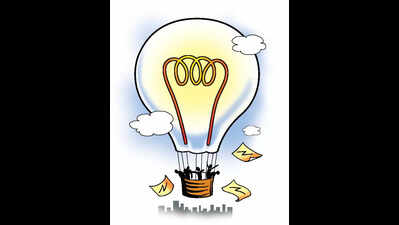Gruha Jyothi boosts power consumption, sparks tax surge for ailing Escoms | Bengaluru News

Bengaluru: Implementation of Gruha Jyothi, a flagship guarantee scheme through which the state govt offers free electricity up to 200 units for domestic households, has not only pushed up energy consumption but also boosted revenue from the 9% ad valorem tax levied on electricity bills.
Escoms collected Rs 3,706 crore in electricity tax in 2024-25, up from Rs 3,240 crore the previous fiscal. The projection for the current year stands at a hefty Rs 4,053 crore.
“Electricity consumption has seen a steady growth after the Gruha Jyothi scheme was introduced in 2023,” said a senior official from the energy department. “So far, 1.7 crore beneficiaries have registered for the scheme. The govt’s reimburses bills of these consumers. The reimbursement to Escoms includes all three components — fixed cost, consumption cost, and tax.”
While Gruha Jyothi beneficiaries receive zero-sum bills, the govt reimburses Escoms the entire amount, including tax. Revenue from this component alone is expected to cross Rs 4,000 crore by the end of 2025-26, marking a staggering 45% increase from Rs 2,823 crore in 2022-23.
The state’s financial commitment to the scheme has risen proportionately. Against a budgeted Rs 9,000 crore, the govt spent Rs 8,700 crore in 2023-24. The allocation increased to Rs 9,657 crore in 2024-25, and chief minister Siddaramaiah has pegged it at Rs 10,100 crore in his budget for 2025-26.
Between Aug 2023 and July 2024, domestic electricity consumption rose by 11.3%. Of this, consumption by Gruha Jyothi beneficiaries alone went up by 7.1%. The state’s total household consumption in 2023-24 stood at 16,089 million units (MUs), which is 1,263 MUs more than in 2022-23.
Registrations for Gruha Jyothi have shown consistent growth. From 1.4 crore households in Aug 2023, the number rose to 1.7 crore by Dec 2024, and by another three lakhs by Jan 2025.
While the scheme’s impact is most evident in the domestic sector, officials say industrial and commercial sector consumption has also grown. However, a long-pending demand from these sectors to reduce electricity tax —from 9% to 3% — remains unresolved. “While we welcome the Gruha Jyothi scheme since it benefits lower income groups and thus helps in empowering them economically, the govt should also think of incentivising the industrial and trade sector, as they contribute to economic growth,” said RC Rameshchandra Lahoti, president of Federation of Karnataka Chambers of Commerce and Industries. “Reduction in electricity tax would be the best move at present when the economy is facing perils of a slowdown.”
However, the govt has remained non-committal on the issue, citing regulatory constraints. “It is up to KERC to take a call. The govt has no role to play in fixing tariffs or tax rates,” said energy minister KJ George.
















